Related Research Articles

French Canadians, or Franco-Canadians, are an ethnic group who trace their ancestry to French colonists who settled in France's colony of Canada beginning in the 17th century.

Franco-Ontarians are Francophone Canadians that reside in the province of Ontario. Most are French Canadians from Ontario. In 2021, according to the Government of Ontario, there were 650,000 Francophones in the province. The majority of Franco-Ontarians in the province reside in Eastern Ontario, Northeastern Ontario, and Central Ontario, although small francophone communities may be found in other regions of the province.

Port Coquitlam is a city in British Columbia, Canada. It is one of 21 municipalities comprising Metro Vancouver. Located 27 km (17 mi) east of Vancouver, it is on the north bank of the confluence of the Fraser River and the Pitt River. Coquitlam borders it to the north and west. Pitt Meadows lies across the Pitt River from it. Port Coquitlam is bisected by Lougheed Highway and the Canadian Pacific Kansas City railway. Port Coquitlam is often referred to as "PoCo". It is Canada's 93rd-largest municipality by population.

Franco-Manitobans are French Canadians or Canadian francophones living in the province of Manitoba. According to the 2016 Canadian Census, 40,975 residents of the province stated that French was their mother tongue. In the same census, 148,810 Manitobans claimed to have either full or partial French ancestry. There are several Franco-Manitoban communities throughout Manitoba, although the majority are based in either the Winnipeg Capital Region or the Eastman Region.
This article presents the current language demographics of the Canadian province of Quebec.
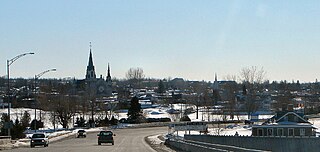
Hawkesbury is a town in Prescott-Russell county in Eastern Ontario, Canada. A majority of its 10,550 inhabitants are francophone.
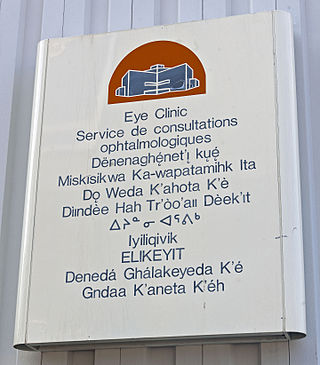
A multitude of languages have always been spoken in Canada. Prior to Confederation, the territories that would become Canada were home to over 70 distinct languages across 12 or so language families. Today, a majority of those indigenous languages are still spoken; however, most are endangered and only about 0.6% of the Canadian population report an Indigenous language as their mother tongue. Since the establishment of the Canadian state, English and French have been the co-official languages and are, by far, the most-spoken languages in the country.
A minority language is a language spoken by a minority of the population of a territory. Such people are termed linguistic minorities or language minorities. With a total number of 196 sovereign states recognized internationally and an estimated number of roughly 5,000 to 7,000 languages spoken worldwide, the vast majority of languages are minority languages in every country in which they are spoken. Some minority languages are simultaneously also official languages, such as Irish in Ireland or the numerous indigenous languages of Bolivia. Likewise, some national languages are often considered minority languages, insofar as they are the national language of a stateless nation.

St. Charles is a town in the Canadian province of Ontario, located in the Sudbury District.
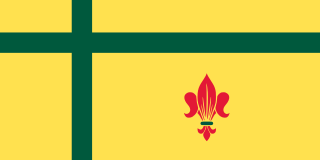
Fransaskois, , Franco-Saskatchewanais or Franco-Saskatchewanians are French Canadians or Canadian francophones living in the province of Saskatchewan. According to the 2016 Canadian Census, approximately 17,735 residents of the province stated that French was their mother tongue. In the same census, 125,810 Saskatchewanians claimed full or partial French ancestry. There are several Fransaskois communities in Saskatchewan, although the majority of francophones in Saskatchewan reside in the province's three largest cities, Saskatoon, Regina, and Prince Albert.
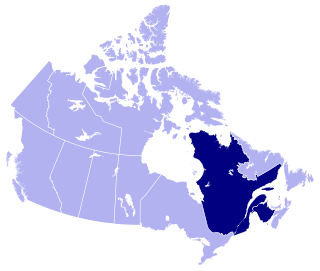
French is the mother tongue of approximately 7.2 million Canadians according to the 2016 Canadian Census. Most Canadian native speakers of French live in Quebec, the only province where French is the majority and the sole official language. Of Quebec's people, 71.2 percent are native francophones and 95 percent speak French as their first or second language.

The official languages of Canada are English and French, which "have equality of status and equal rights and privileges as to their use in all institutions of the Parliament and Government of Canada," according to Canada's constitution. "Official bilingualism" is the term used in Canada to collectively describe the policies, constitutional provisions, and laws that ensure legal equality of English and French in the Parliament and courts of Canada, protect the linguistic rights of English- and French-speaking minorities in different provinces, and ensure a level of government services in both languages across Canada.
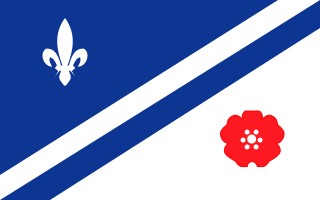
Franco-Albertans are francophone residents of the Canadian province of Alberta. Franco-Albertans may also refer to residents of Alberta with French Canadian ancestry, although publications from the government of Alberta use the term Franco-Albertan to refer to its francophone residents. In the 2016 Canadian Census, there were 86,705 Albertans that stated their mother tongue was French. In the same census, there were 411,315 Albertans that claim partial or full French ancestry.

Franco-Columbians are French Canadians or Canadian francophones living in the province of British Columbia. According to the 2016 Canadian Census, 71,705 residents of the province stated that French is their mother tongue. In the same census, 388,815 British Columbians claimed full or partial French ancestry.
The Conseil scolaire francophone de la Colombie-Britannique is the French-language school board for all French schools located in British Columbia. Its headquarters are in Richmond in Greater Vancouver. Unlike the other school boards in British Columbia, this school board does not cover a specific geographic area, but instead takes ownership of schools based solely on language.
The language policies of Canada's province and territories vary between the provinces and territories of Canada. Although the federal government operates as an officially bilingual institution, providing services in English and French, several provincial governments have also instituted or legislated their own language policies.

The French language became an international language in the Middle Ages, when the power of the Kingdom of France made it the second international language, alongside Latin. This status continued to grow into the 18th century, by which time French was the language of European diplomacy and international relations.
English-speaking Quebecers, also known as Anglo-Quebecers, English Quebecers, or Anglophone Quebecers or simply Anglos in a Quebec context, are a linguistic minority in the francophone province of Quebec. According to the 2011 Canadian census, 599,225 people in Quebec declare English as a mother tongue. When asked, 834,950 people reported using English the most at home.
Francophone Canadians are citizens of Canada who speak French. In 2011, 9,809,155 people in Canada, or 30.1% of the population, were Francophone, including 7,274,090 people, or 22% of the population, who declared that they had French as their mother tongue.
References
- 1 2 "2021 Census Profile". 29 March 2023.